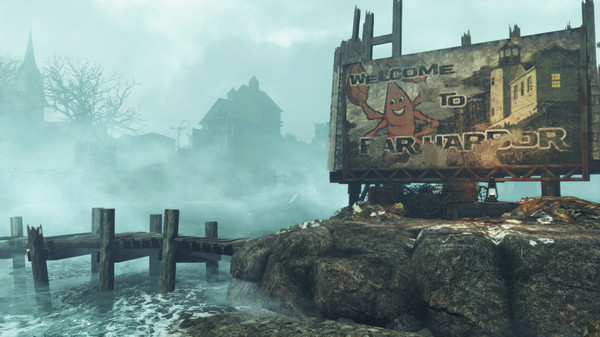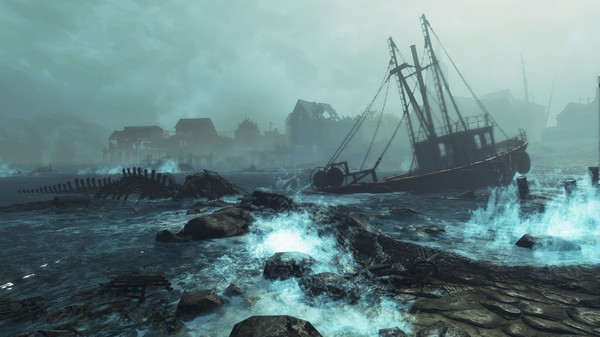So I booted up the premium content DLC pack last bit of the season pass for Fallout 4 over the weekend and I had a little play. A little play where I finished the main quest, gone through a bunch of dialogue with Nick Valentine, and resolved the settlement problems on the island. In all it was a lackluster experience not at all worth the 25 USD of the standalone nor the 50 USD of the season pass and would be buyers would be better off grabbing other games for the price of this DLC. For me personally this is due to a small quest pool, and quest depth (in terms of available actions), followed by janky game mechanics and a lack of character in many NPCs. However before reaching into that criticism lets look to what the DLC does correctly.
For the positives of the DLC, its all mainly constrained to the aesthetic content such as equipment, weapons and new area that the game showcases, however these while interesting almost fall into the modding level of quality in terms of what they add to the game. Other mods provide much of these improvements already to the game such as expanding on settlement behavior, adding in weapons, providing new aesthetic looks to players and NPCs. Nevertheless the quality and the scope of the DLC might be seen as slightly improved from modders, especially seeing as it is paid content. So depending on how much the art style of the DLC hits you, it can be considered as a nice bit of content for those who don't use mods.
That aside what Bethesda can alter and make use of (that many modders don't have is access to) are game mechanics, voice actors, and the ability to put in quality stories.
Voice acting within the DLC is largely good, but in terms of examining characters beyond the five or six lines of dialogue that they have reveals a lot of shallowness within the game world. Talking to Children of Atom reveals a very shallow conception of worship or religion. An option to ask why, or to challenge some convictions (including those of the Piratey Far Harbor) would make for some interesting conversation, but to a large part many NPCs play caricatures and are fixed in what they can say and do. That being said the same occurs within Fallout 4's main game, however there the game goes to a lot more effort to hide this lack of options, through scripted confrontations (through the follower quests or main quest). In Far Harbor this lack of options is too obvious for a suspension of disbelief to ignore.
The game mechanics consist a hacking tower defense mini-game that looks and plays worst than any hacker aesthetic tower defense I can think of (see Antichamber, Tron 2.0, Minecraft, Consortium's shooter training, Cradle's mini-games). This tower defense section was made using the workshop mechanics and as such makes for a frustrating experience.
 |
| Fallout 4: Far Harbor's minigame, and yes that overlay is always on the screen. |
To put this in perspective I spent a 15 minutes trying to put down a square block to complete a puzzle, simply because the clipping would cause the block to disappear among another one. Never mind the fact that this mini-game was not at all enjoyable, but also critical to finishing off the DLC's quest line.
 |
| Kellogg's dream sequence |
This especially in the light of Kellogg's dream sequence of Fallout 4's main game seems to be a surprising oversight in design - nearly anything could have been placed in that section, but they chose to have an uninspired, broken and visually bland level. It seems surprising that it was put in the game at all especially since all it does is unlocks an audio log. It seems to detract a lot from the DLC in terms of quality. The rest of the game falls into the 'hey watch out for radiation' or the shoot and loot which is the bread and butter of all Fallout games.
The story which carries players through to the DLC and through to different quests is an uninspired retelling of events that occurred in the first game.
In this the story of Far Harbour, largely a retelling of Fallout 4's narrative, fails since it adds nothing to the overall world of Fallout. For example plot of the DLC revolves around finding a missing girl and through that choosing the fate of three communities on an island. Fallout 4 revolves around finding a missing son (boy) and through that choosing the fate of three communities on a landmass. Of course there are some differences, but the main narrative beats (including that of a level in someone elses brain) doesn't provide any new surprises. The one interesting aspect of the plot questioning whether the player is a synth or human, is quickly forgotten among the gameplay of going to a location, kill enemies and collect an item.
The way in which the narratives complete seems to rely more on providing a neat end to stories by having factions or faction leaders dying off, rather than seeing how they can operate together. A compromise can be achieved by simply not completing quests, but the fact that there's no option provided by Bethesda to compromise is telling of the simplicity involved with all the quests in this DLC.
To emphasis this the backstory for each faction is kept an arms length away from quests. Meaning that any revelations the player makes about each community has no bearing on the quest options they can make. The fact that certain leaders were assassinated, are synths, or have history with other characters makes no difference to how players can complete quests. In the end of the DLC players find their missing girl, saving or kill the different factions on the island and go back to the Commonwealth - with little to no resolution provided by the game besides another gun.
In all it seems that the actions you take really do not matter in the scheme of things. Within Fallout 4's main game building settlements, completing companion quests, finding the player's son and talking to the different factions felt like a nuanced journey. This DLC seems like a mods attempt to emulate some of that scope, instead of doing its own thing.

